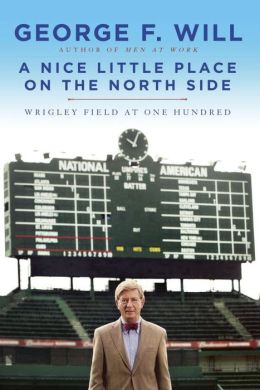
You might know George Will best from all those Sunday mornings he spent unabashedly flirting with Cokie Roberts back when David Brinkley was hosing the Sunday morning ABC politics show. Or, you may know him for writing a fawning tribute to the genius of The Genius, Tony LaRussa. Since we’re all Cubs fans here, we all know that he famously said that while growing up in Champaign, Illinois he had to make the choice between rooting for the Cubs or the Cardinals, and he chose a life of misery and disappointment–two things normally associated with living in Champaign in the first place.
I know I wasn’t the only person with a Cubs web site to get sent an advance copy of Will’s new book, “A Nice Little Place On The North Side” (apparently Random House didn’t get the “fading blog star” memo), but I seem to be the only one who actually read it. Hell, Yellon will do anything for something free, and even he hasn’t written a review of it yet.
The book, is ostensibly a breezy history of the 100 years of Wrigley Field, and the stuff that’s gone on inside of the old ballpark. Some of the most interesting stuff has little to do with the Cubs (not surprisingly.) One long passage is the history of beer. Seriously. It’s actually fascinating and well done.
Some of the most egregious things in the book include:
- George dedicated the book to Interim Commissioner of Baseball for Life Bud Selig and Bud’s wife Sue.
- He boasts that he was at the infamous Bartman game in Andy MacPhail’s box.
- He includes Lee Elia’s immortal 1983 post-game tirade, but censors it.
Some of the good stuff includes:
- A very uncensored version of Babe Ruth’s explanation of his called shot in the 1932 World Series.
- An in-depth explanation of the circumstances surrounding Anton Cermak’s assassination in 1933.
- The story of Harry Caray getting canned from the Cardinals broadcast team for banging Auggie Busch’s wife.
The book is not just a history of Wrigley, and it’s better for it. George’s tour through the 100 years is a meandering one, where asides and anecdotes are often times more interesting than whatever the main narrative was in the first place. Most of us have over the years hear or read many of these stories, but there are enough new ones, or embellishments on what we thought we knew that it makes it interesting.
Inevitably, any book on the 100 years the Cubs have spent at Wrigley is a recitation in failure. He even gets into the math about how improbable it is that the Cubs haven’t won a World Series in a century. We know the odds are absurd. Â We’ve lived it.
At 194 pages, I enjoyed the romp through ten decades of Wrigley Field.
Certainly, more than Lee Elia did.



I’ve noticed over the years that George Will makes more sense writing about baseball than politics. Like him I grew up in central Illinois (Bloomington) and have been cursed for making the wrong choice. I blame my Dad, but since he is dead there is no one to complain to or cares.
“hosing the Sunday morning ABC politics show”. Brilliant! oh…